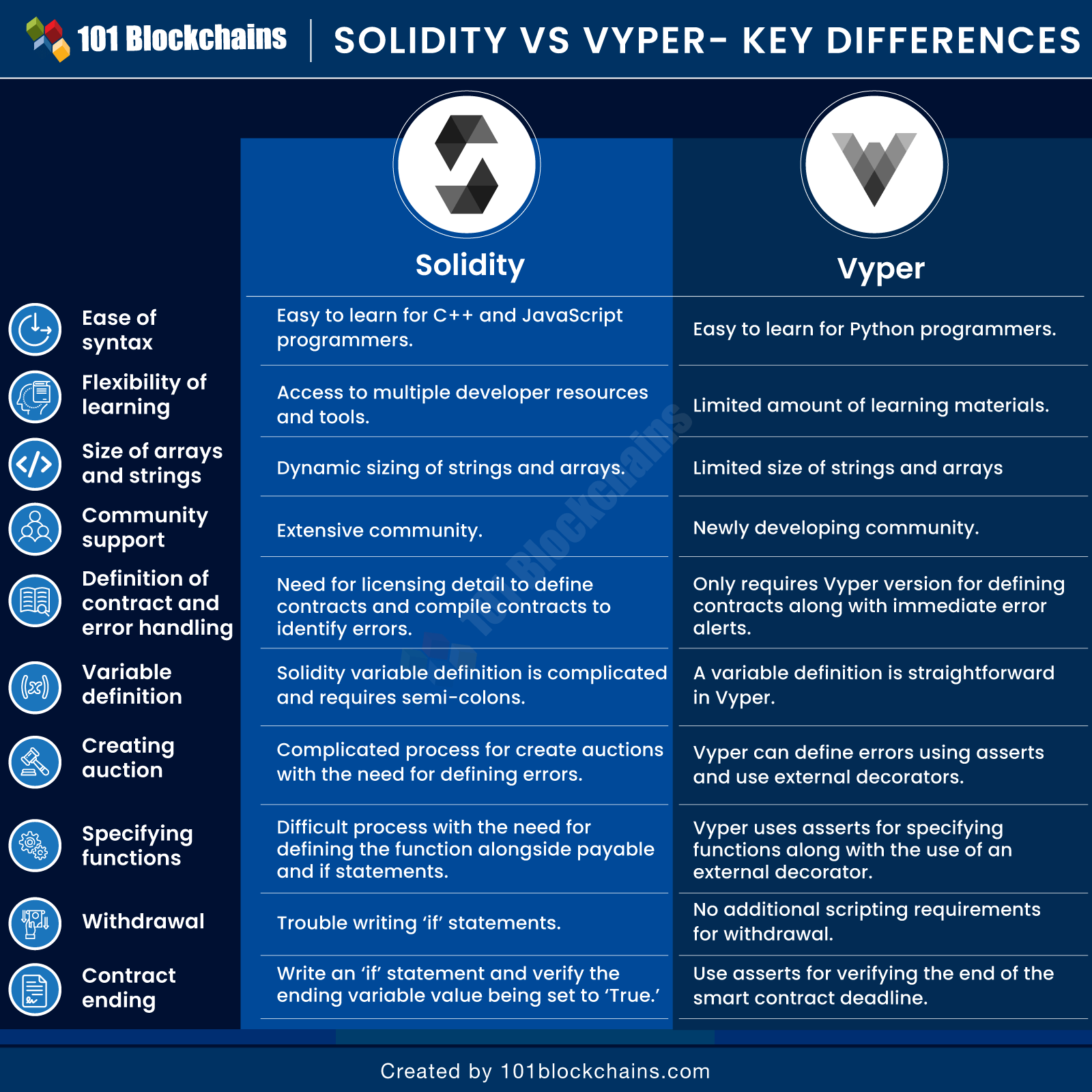Smart contracts have become one of the most significant aspects of the evolving blockchain ecosystem. The ability to create self-executing code in accordance with specific conditions is a favorable highlight for smart contracts. However, developers are constantly worried about the Vyper vs Solidity comparison and similarities in their functions.
Which one is a better choice for creating smart contracts? Solidity is obviously the older alternative and has been around for quite some time. On the other hand, Vyper is new, albeit with better performance in smart contract development. The following discussion helps you learn the important differences between Solidity and Vyper to find out the better alternative.
Build your identity as a certified blockchain expert with 101 Blockchains’ Blockchain Certifications designed to provide enhanced career prospects.
Basics of Smart Contracts
The discussions on Solidity vs Vyper comparison would draw attention to the basics of smart contracts. Smart contracts are one of the significant highlights associated with blockchain technology, introduced for the first time on Ethereum. As of today, Ethereum is the biggest ecosystem supporting the use of smart contracts. It is important to note that you wouldn’t have any popular applications like Uniswap or Aave without smart contracts.
Without any smart contracts, you would never have any DeFi services. Smart contracts are basically programs that run forever on an Ethereum blockchain. The smart contract features collection of data and code at a particular address on Ethereum blockchain. Most important of all, smart contracts can run the desired tasks in a predictable and deterministic way.
The understanding of differences between Vyper and Solidity is possible only with awareness regarding high-level and low-level programming languages. High-level programming language refers to a human-readable language that anyone can understand easily. It can help in identifying what the code can help you achieve.
On the other hand, low-level programming language or code refers to a machine-readable language that helps in understanding and executing code. Low-level code is easier to understand for machines, while high-level code is easy to understand for humans. Interestingly, the compiler can help in bridging the gap by converting high-level code into low-level code. A high-level language is a better choice for designing smart contracts, as creating the low-level bytecode for smart contracts could take around months for implementation.
Excited to learn the basic and advanced concepts of ethereum technology? Enroll Now in The Complete Ethereum Technology Course
Smart Contract Programming Languages
Since smart contracts are important components in the emerging crypto ecosystem, developers must know about the best programming languages. Which programming languages are suitable for designing smart contracts? The differences between Ethereum smart contract languages could help you determine the better choice between Solidity and Vyper for smart contract development. Some of the other important languages for smart contract development include Yul, FE and Yul+.
At the same time, you must also notice certain important basics regarding smart contract programming languages. For instance, Ethereum does not rely on a real machine for running the contract and uses the EVM for executing smart contracts. On the other hand, all the languages for smart contract coding must be converted into machine-readable bytecode. Irrespective of the multiple options available among smart contract programming languages, Solidity and Vyper has marked a significant influence. Let us learn about the basics of both smart contract programming languages to find the ideal choice among them.
-
Solidity

Any individual associated with the world of blockchain and smart contracts must have come across Solidity at any point. Solidity is a high-level, contract-oriented programming language, drawing heavily on inspiration from C++, JavaScript and other high-level languages. As a statically typed language, Solidity could help in defining the type of value stored in a variable, which would allow the compiler to have knowledge of the type of data.
Such an approach is an essential requirement for coming up with deterministic applications. The answers to “Is Vyper better than Solidity?” are quite crucial for developers, especially with Solidity being an established player. The sheer variety of advantages of Solidity, such as availability of multiple learning resources, massive community support and developer tools, is commendable. However, Solidity also shares some setbacks which can be quite difficult to ignore.
Want to get an in-depth understanding of Solidity concepts? Become a member and get free access to Solidity Fundamentals Course Now!
-
Vyper

The next player in the Vyper vs Solidity comparison draws attention toward Vyper, the second most popular smart contract programming language. You can think of it as a practical alternative to the Solidity smart contract programming language. Vyper is also a contract-oriented, high-level programming language with a structure similar to Python programming language.
The primary target of Vyper focuses on the Ethereum Virtual Machine or EVM. It has been developed particularly for resolving the setbacks evident in Solidity, such as security issues. One of the remarkable details about Vyper refers to the similarities with Python programming language. However, Vyper has excluded many object-oriented concepts evident with Solidity, such as inheritance.
Vyper has evolved as the alternative to Solidity by eliminating certain features, which can make the contracts secure and auditable. As a result, the Solidity vs Vyper comparison could focus more on ensuring limited errors in smart contracts. The strongly-typed language ensures freedom from any type of mishap during the processing of different data types.
Vyper can allow Python developers to get started easily with the desired transparency for security and readability. In addition, Vyper has also been through some promising improvements in terms of development tools in recent times. On the other hand, Vyper falls down in the differences between Vyper and Solidity on the grounds of limited community support.
At the same time, it lacks many features which you can find readily available in Solidity. However, Vyper can ensure favorable traits, such as setting the precise upper limit for gas consumption. Furthermore, the limitations on array and string in Vyper could ensure better safeguards for the contract against common attacks.
Excited to learn about the key elements of Solidity? Check the presentation Now on Introduction To Solidity
Differences between Solidity and Vyper
The overview of fundamental details pertaining to Solidity and Vyper gives a clear impression of their capabilities. However, a detailed comparison between both smart contract programming languages on the grounds of relevant pointers could help you make a better choice. Here are some of the notable differences between Solidity and Vyper for smart contract developers. Here is an outline of the differences between Solidity and Vyper in the form of a table.

Please include attribution to 101blockchains.com with this graphic. <a href='https://101blockchains.com/blockchain-infographics/'> <img src='https://nftsteacher.com/wp-content/uploads/sites/15/2022/09/Solidity-vs-Vyper-Key-Differences.png' alt='Solidity vs Vyper='0' /> </a>
-
Ease of Syntax
The syntax is one of the first concerns of developers when choosing a specific programming language. Interestingly, both Solidity and Vyper have simple and easy-to-understand syntax, as both of them are high-level languages. The differences between Ethereum smart contract languages on the basis of syntax can be quite confusing.
However, Solidity emerges as a clear winner with the simple syntax, as it features similarities to C++ and JavaScript, two of the most commonly used programming languages. On the other hand, Vyper is no less simple or easy to use in comparison to Solidity. The similarities of Vyper with Python offer the perfect opportunity for anyone with knowledge of Python to understand Vyper syntax.
-
Flexibility of Learning
Smart contract developers could also reflect on answers to “Is Vyper better than Solidity?” by identifying the ease of learning. Which language is easier to learn for beginners? The similarity of syntax with popular programming languages is not the only criterion that can determine how users can familiarize with the new language. On the contrary, you must also check whether you can find adequate resources to learn the programming language as a beginner.
As of now, Solidity presents a significant advantage in the fact that it is one of the most popular smart contract programming languages used by Ethereum developers. Therefore, you can access multiple learning resources and tools for beginners on Solidity. Vyper is a comparatively new language and does not feature extensive documentation like Solidity. Although developers can learn about Vyper with basic skills in Python, it has a lighter and simpler design which makes it easier to ensure audits.
Want to learn the basic and advanced concepts of Ethereum? Enroll in our Ethereum Development Fundamentals Course right away!
-
Size of Arrays and Strings
The Vyper vs Solidity comparison also sheds light on the size of arrays and strings in the programming languages. In the case of Solidity, you would find support for dynamic sizing of strings and arrays. The developers could change the length of the string according to their requirements. On the other side of the comparison, Vyper imposes limits on array and string size. As a result, it can ensure limited vulnerability of the smart contract to any potential attacks.
-
Community Support
The extensive use of Solidity has resulted in the development of a massive community of developers, enthusiasts, experts and professionals. Therefore, Solidity developers can enjoy the privilege of backing from the massive community. On the other hand, Vyper is still under development, and so is the community behind it. As of now, Vyper has limited functionalities in comparison to Solidity and targets a limited group of developers with niche programming needs. Therefore, you are less likely to find community support for Vyper, like Solidity, any time soon.
-
Definition of Contracts and Error Handling
The overview of differences between Vyper and Solidity would also reflect on the ease of defining contracts and managing errors. You can use Brownie and VSCode for defining the licenses and version of Solidity you use for a contract. On the other hand, you have to list only the version of Vyper you use for defining a contract.
The power of Solidity also appears a bit downscaled with the need to compile a contract before identifying typo mistakes. However, Vyper can serve a credible advantage with the flexibility for identifying the slightest typos immediately. As a result, Vyper not only makes contract definition simpler but also improves debugging efficiency.
Want to know the real-world examples of smart contracts and understand how you can use it for your business? Check the presentation Now on Examples Of Smart Contracts
-
Variable Definition
Apart from the definition of contracts and error handling, the Solidity vs Vyper debate would also turn towards variable definition. In the case of Vyper, a variable definition is quite straightforward and signifies the traits of a true high-level programming language. On the contrary, Solidity presents many complicated implications pertaining to the declaration of variables. In addition, you can also notice the troublesome mandatory concerns of adding semi-colons in Solidity. Basically, Vyper aims to make variable definition easier, thereby helping you achieve the best results for easy smart contract programming.
-
Creating Auctions
The difference between Vyper and Solidity on the grounds of flexibility for creating auctions is also another important highlight in the comparison. You would need a straightforward process for creating auctions in Vyper, and giving it an external decorator could ensure that you can call it from other contracts.
Similarly, you can also specify all the other elements in the auction according to your requirements. As compared to the errors defined with a Solidity programming language, Vyper offers to assert as the reliable alternative. The auction would stay open for bidding with Vyper until the ‘block.timestamp’ value stays lower than auction run time.
If you are new to smart contracts, you might not be sure of its capability. Check the detailed guide Now on Smart Contract Use Cases
-
Specifying the Functions
The function definition is also an important highlight in Vyper vs Solidity comparison, especially with the simplicity of the function. You can use an external decorator and mark it for receiving the necessary funds for the transaction. Irrespective of the language used, the bid function must be marked as payable for receiving funds.
The smart contract language must verify compliance with all conditions for placing a bid by using assert. In the case of Solidity, you can define the function, albeit while passing the external and payable elements within the function, in comparison to decorators. Rather than using asserts of Vyper, Solidity developers have to rely on the complicacies of ‘if’ statement.
-
Withdrawal
The smart contract specifications for withdrawing funds are another important highlight of the differences between Solidity and Vyper. You can notice the Vyper vs Solidity debate in the simplicity of the withdraw function in Vyper. In the case of Solidity, you can define the amount alongside the trouble of writing ‘if’ statements. On the contrary, Vyper keeps the whole thing simple.
-
Ending the Contract
The final stage of the smart contract development process also specifies the line of difference between Ethereum smart contract languages with details. In the case of Vyper, you would have to use assert to verify that the time has run out. On the other hand, Solidity would bring you back to writing ‘if’ statement before switching ended variable to “True.” At the same time, you have to emit the end of the auction and transfer funds rather than sending funds like in Vyper.
Start learning Blockchain with World’s first Blockchain Skill Paths with quality resources tailored by industry experts Now!
Final Words
The final overview regarding the differences between Vyper and Solidity shows that Vyper is a favorable alternative. It wins over Solidity by a huge margin, especially in terms of simplicity. Vyper is easier to understand, especially if you have a background in Python. On the other hand, Solidity has massive strength in the form of community support alongside access to developer tools and resources.
Therefore, the use case for smart contract developers would determine the ideal choice of smart contract programming language for you. As the demand for blockchain-based applications and smart contracts grows, the comparison between Solidity and Vyper will become more necessary. Learn more about both tools and find the best choice now.
Join our annual/monthly membership program and get unlimited access to 35+ professional courses and 60+ on-demand webinars.
The post Vyper vs Solidity- Key Differences Between Ethereum Smart Contract Languages appeared first on 101 Blockchains.
